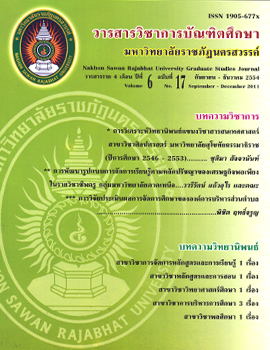แนวทางการมีส่วนร่วมในการบริหารงานวิชาการของคณะกรรมการสถานศึกษาขั้นพื้นฐานในเขตอำเภอเก้าเลี้ยว สังกัดสำนักงานเขตพื้นที่การศึกษานครสวรรค์ เขต 1
Main Article Content
Abstract
บทคัดย่อ
การวิจัยครั้งนี้มีวัตถุประสงค์ เพื่อศึกษาปัญหาและนำเสนอแนวทางการมีส่วนร่วมในการบริหารงานวิชาการของคณะกรรมการสถานศึกษาขั้นพื้นฐานในเขตอำเภอเก้าเลี้ยว สังกัดสำนักงานเขตพื้นที่การศึกษานครสวรรค์ เขต 1
ประชากรที่ใช้ในการวิจัย ได้แก่ คณะกรรมการสถานศึกษาขั้นพื้นฐานในเขตอำเภอเก้าเลี้ยว จำนวน 204 คน เครื่องมือที่ใช้ในการวิจัยเป็นแบบสอบถามชนิดตรวจสอบรายการแบบมาตรประมาณค่า 5 ระดับ มีค่าความเที่ยง 0.97 และแบบบันทึกการสนทนากลุ่ม วิเคราะห์ข้อมูลโดยการแจกแจงความถี่ หาค่าเฉลี่ย ค่าเบี่ยงเบนมาตรฐานและการวิเคราะห์เนื้อหา
ผลการวิจัยพบว่า
1. ปัญหาการมีส่วนร่วมในการบริหารงานวิชาการของคณะกรรมการสถานศึกษาขั้นพื้นฐานในเขตอำเภอ เก้าเลี้ยวอยู่ในระดับ ปานกลาง โดยมีปัญหาสูงสุดได้แก่ด้านการพัฒนาหลักสูตรสถานศึกษา
2. แนวทางการมีส่วนร่วมในการบริหารงานวิชาการของคณะกรรมการสถานศึกษาขั้นพื้นฐาน ในเขตอำเภอเก้าเลี้ยว สังกัดสำนักงานเขตพื้นที่การศึกษานครสวรรค์ เขต 1 มีดังนี้
2.1 ด้านการพัฒนาหลักสูตรสถานศึกษา ได้แก่ สร้างการรับรู้และเข้าใจเกี่ยวกับหลักสูตรสถานศึกษา ประชุมเพื่อรับทราบการดำเนินงานด้านหลักสูตรของสถานศึกษา สนับสนุนงบประมาณในการจัดทำหลักสูตรของสถานศึกษา สนับสนุนแหล่งเรียนรู้ในชุมชนแก่สถานศึกษา
2.2 ด้านการจัดการเรียนการสอน ได้แก่ การส่งเสริมแหล่งเรียนรู้ทั้งในและนอกสถานศึกษา สนับสนุนงบประมาณในการจัดการเรียนการสอน จัดหาภูมิปัญญาท้องถิ่นแก่สถานศึกษา และส่งเสริมการเรียนรู้ของผู้เรียนนอกสถานศึกษา
2.3 ด้านการนิเทศการศึกษา ได้แก่ การมีส่วนร่วมในการดูแลความประพฤติของนักเรียนเมื่ออยู่นอกสถานศึกษาสนับสนุนงบประมาณในการจัดแสดงนิทรรศการผลงานนักเรียน สร้างความสัมพันธ์เครือข่ายระหว่างสถานศึกษากับชุมชน
2.4 ด้านการวัดผลและประเมินผลการศึกษา ได้แก่ การสนับสนุนการวัดผลประเมินผลตามสภาพจริง ส่งเสริมการจัดทำเอกสารหลักฐานทางการศึกษา ช่วยประชาสัมพันธ์เผยแพร่การวัดผลประเมินของสถานศึกษาต่อสาธารณชน สนับสนุนสิ่งอำนวยความสะดวกในการวัดผลประเมินผลการศึกษา
Abstract
The purposes of this research were to study the problems and to present a participation model on academic administration of primary schools in Kao Lieo District, the Office of Nakhon Sawan Educationnal Service Area 1.
The population of this research were the primary school committees in Kao Lieo District, the Office of Nakhon Sawan Service Area1 in2010 academic year with a total of 240 people. The instruments used in collecting the data were a 5-point rating scale questionnaire, with reliability value of 0.97, and a focus group discussion form recording. Data collection methods were done by investigating the issue for the problems of participation and having focus group meetings to propose the guidelines for participation in academic administration. The data were analyzed by way of using frequency, average, standard deviation and content analysis.
The results of the research were as follows :
1. The issues involved in academic administration were at the moderate level.
2. The guidelines for participation in academic administration of primary school committees in Kao Lieo District, the Office of Nakhon Sawan Educationnal Service Area 1 are as follows:
2.1 In curriculum development, awareness and understanding of curriculum development, conference to acknowledge the work of the school curriculum, budget support to the activities of educational institutions and supporting learning resources in the community for schools by the committees are essential.
2.2 In teaching and learning management, the matters expected from the committees were participation in promoting learning resources both inside and outside of school, financial support for teaching and learning, providing local wisdom to the school, development in teaching and learning of the school and promoting learning among students outside the school.
2.3 For the educational supervision aspect, necessary requirements were participation in taking care of student behavior outside of school, budget supporting in an exhibition of student work, building networks between school and community and appreciation of student presentations.
2.4 For the educational assessment and evaluation things needed were participation in support in assessing the actual condition, promoting the preparation of document, recognizing the importance of assessing, publicizing the assessment results of the schools and supporting facilities for educational measurement and evaluation.


